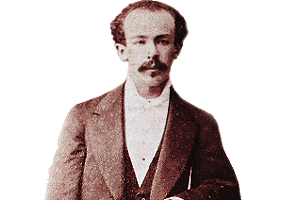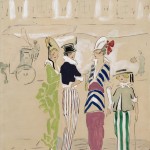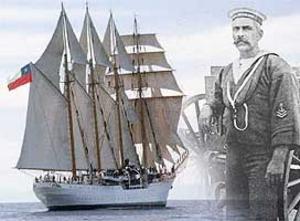He was born in Santiago on October 21st, 1852. He studied at the Instituto Nacional and then enrolled in the Universidad de Chile, where he became a lawyer in March of 1873.
In 1874, minister of Foreign Relations Adolfo Ibañez named him secretary of the legation in Peru. In Lima, he discovered his intellectual calling when he came in contact with the colonial files piled up in the old capital of the viceroyalty.
After this he headed to the United States (1876), and from there to Europe.
He visited England, managing to study matters relating to Chile’s colonial literature at the British Museum; then he passed through Paris and then on to Spain, where he did some research on the Archivo de Indias (File of the Indies).
In 1877 he returned to Chile and published History of the Inquisition in Lima in Santiago, and the next year he publish Biblioteca Americana (American Library).
Her visited the Araucania, a trip that led him to write his book Los Aborigenes de Chile (The aborigines of Chile).
Once the Pacific war had begun, he moved up north to offer his services. This way, he held the position of war auditor (Judge advocate) for the army reserve, and later he was a judge in Iquique. In 1883, he was appointed to create the Archivo de la Capitania General (Archive of the General Capitancy)
At the end of 1884 he was named secretary of the Chilean legation in Spain (Patricio Lynch was its plenipotentiary minister). Here, he took the opportunity to investigate in Spanish libraries and archives.
Upon his return he had obtained some 17,799 copied pages ready to print.
In 1887, he published History of the Inquisition in Lima, and the following year, his most renown work, the Colleccion de Historiadores de Chile y la de Documentos ineditos para la Historia de Chile (Collection of Chilean Historians and Unpublished Documents for the History of Chile).
The revolution of 1891, during which he was a supporter of president Balmaceda, interrupted his work, having to move to Argentina and from there on to Europe. He returned in 1895, once again beginning to publish his collections.
The Universidad de Chile (1897) named him an academic member, holding first chair of American and Chilean Documentary History.
In 1902 he went to the Old Continent to study the organization of European archives and libraries. His fifth trip took place in 1912, commissioned by the Ministry of Public Instruction for him to research the organization of the Notary Archive of Madrid.
In 1925 he donated his research library, made up by 60,000 printed texts, 1,668 original manuscripts and 8,659 transcribed documents, to the Chilean government. For this reason, a room at the National Library bears his name.
He passed away in Santiago on December 11th, 1930.








